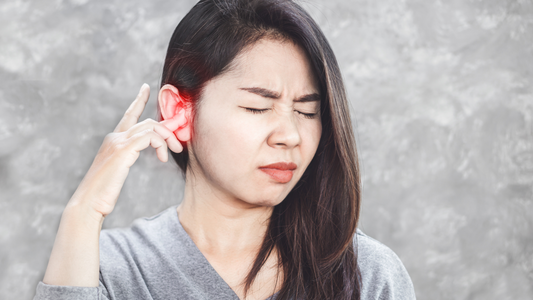Noticed a strange whistle or ring in your ears when trying to relax? You're winding down, ready to dive into a book, or sip some tea, and there's an annoying buzz. That's tinnitus, an unwelcome guest that lingers too long. Ever wonder why it flares up at bedtime? Let’s look into what’s behind that aggravating noise in your ears and how you can handle it.
Ever had your ears ring after a loud event or fireworks? That’s your ears’ way of saying they’ve had enough. For some, that ringing is a persistent bother, turning peaceful nights into a battle for sleep. But there’s hope! There are some clever ways to manage it and reclaim your night’s rest. Curious to know more? Let’s ease into understanding tinnitus and find techniques for a quieter night.
Tinnitus Causes
Unraveling the source of that persistent ringing ears involves looking at different triggers of tinnitus. It's more than just an irritating sound; it's a nuisance that disrupts your peace. For instance, think about the years spent around heavy machinery without proper ear protection. That level of noise can damage the sensitive parts of your inner ear. And it's not only about loudness; some medications might also bring about tinnitus as a side effect while they're treating something else in your system.
Consider your own life - ever enjoyed music a bit too loudly or spent hours using power tools? Exposure to loud sounds over time can result in annoying ear ringing. And it's not uncommon – it's something a lot of folks with tinnitus have experienced. Surprisingly, the pills you take to ease ongoing pain or antibiotics for a severe cough might also play a role in triggering tinnitus.
Thankfully, not every cause of tinnitus is severe. Sometimes, it's just earwax buildup clogging your hearing channels. Cleaning out earwax can often restore peace and quiet. However, if the underlying issue is damaged hair cells in the inner ear, you might be stuck with that ringing for the long haul. And let's not forget, conditions like high blood pressure or a neck injury can also lead to tinnitus, adding an unwelcome soundtrack to your day.
Keep track of what might be causing your tinnitus. That constant ringing could be your body's way of saying, "Take it easy and protect those ears."
Why You Get Tinnitus When Lying Down
Noticed how that ringing in your ears gets louder at night when you’re trying to sleep? Quite the bother, isn’t it? You’re finally cozy, lights out, and there goes your tinnitus, stealing the spotlight. Here’s the deal: when you’re vertical, your blood flows smoothly, and it’s all good. But hit the pillow, and it can feel like your circulation flips upside down. Your ears tune into the symphony of blood whooshing around your head, and that can crank up tinnitus for some.
Let’s keep it simple. Your inner ear is nestled right next to where all this action happens. When you clock out for the night, if your tinnitus is linked to nerve or vascular issues, you might notice it gets more insistent. It’s like getting a backstage pass to a vascular orchestra, only you didn’t buy the ticket. And everybody’s different – you might find sleeping on one side more restful than sprawled on your back or stomach.
What to try? Mix up how you lie down could be your ticket to quieter nights. Can’t get rid of the din? Earbuds and some soothing tunes might do the trick; just keep the volume on the down low. And hey, don’t forget about your doctor. They’re your ally in the hunt for blissfully quiet sleep.
Tinnitus When Lying Down at Night

Getting to the bottom of increased tinnitus at night can be quite the puzzle for many. You're settled in, the house is quiet, and that’s when your ears decide to pipe up with their own private concert. It’s like the silence flips a switch, and suddenly that hum or whine in your ears seems a lot less bashful.
The thing is, during the day your hearing is part of a team, picking up a mixture of sounds. Come nightfall, it's like your ears are left alone in the locker room - the background noises have vanished, and tinnitus takes the lead.
Also, when you’re stretched out in bed, everything settles down, including your body. That can mean you're more aware of your heartbeat or the blood flowing in your ears, and yes, that ringing too. Stress from your day can also hang around like an unwanted guest, adding its two cents to the noise in your ears.
A simple fan or some ambient background sounds could be a lifeline for those trying to drown out tinnitus. It’s about giving your ears something less intrusive to listen to. Think of it as a decoy that lures your brain away from the tinnitus. And if that’s not enough, consider a pillow with built-in speakers as another tool in your better-sleep arsenal.
Conclusion
Managing tinnitus when you're lying down often calls for a bit of background noise. A white noise machine could be just what the doctor ordered. It helps by drowning out the tinnitus sounds and providing a steady sound for your brain, so it doesn't feel the need to fill any silence with the ringing.
If your tinnitus is connected to blood flow issues, certain meds might help by widening your blood vessels and boosting oxygen to your ears. Before starting any new medication, though, have a word with your doctor. They're on your side to make sure your health plan is on track.
So, anybody out there find their ears ringing more when hitting the hay? What's your strategy for quieting down that noise? Drop a comment and share your tips—you might have the perfect solution someone else is searching for. Let's all help each other turn down the volume on tinnitus and enjoy some quality sleep.
Wrap-Up: Tackling Tinnitus at Bedtime
So there's this persistent buzz in your ears that seems to come alive when you're trying to fall asleep. You're familiar with the drill: everything's dark and quiet, then out of nowhere, tinnitus turns up the volume. But hold on, there are a few things you can try to push back against that noise and reclaim some peace and quiet for sleep.
That nightly concert your ears are playing doesn't have to rob you of rest. Consider slipping a white noise machine into your evening routine or maybe switch up how you're sleeping. Small changes like these can make a difference. And if you're up against a stubborn case of tinnitus that refuses to quit, it might be smart to chat with your doctor. Ears can be complicated, but remember, you're far from being the only one dealing with this issue. Now, who's up for showing tinnitus the door and getting some well-deserved shut-eye? Here's to hoping for quieter nights ahead.
Sources & References
- Baguley, D., McFerran, D., & Hall, D. (2013). Tinnitus. The Lancet, 382(9904), 1600-1607. https://www.thelancet.com/journals/lancet/article/PIIS0140-6736(13)60142-7/fulltext
- Bhatt, J. M., Lin, H. W., & Bhattacharyya, N. (2016). Prevalence, severity, exposures, and treatment patterns of tinnitus in the United States. JAMA Otolaryngology–Head & Neck Surgery, 142(10), 959-965. https://jamanetwork.com/journals/jamaotolaryngology/fullarticle/2533660
- Hoare, D. J., Searchfield, G. D., El Refaie, A., & Henry, J. A. (2014). Sound therapy for tinnitus management: practicable options. Journal of the American Academy of Audiology, 25(1), 62-75. https://www.thieme-connect.com/products/ejournals/abstract/10.3766/jaaa.25.1.5
- Savage, J., & Waddell, A. (2014). Tinnitus. BMJ Clinical Evidence, 2014, 0506. https://www.ncbi.nlm.nih.gov/pmc/articles/PMC4202665/

The Hear Well Group Research Team: Trusted Hearing Health Insights
Our experienced research team compiles hearing health data from credible, peer-reviewed sources and presents it in easy-to-understand terminology. We ensure accuracy and trustworthiness, providing up-to-date, evidence-based recommendations to enhance hearing care practices and inform our readers' hearing well-being decisions.


